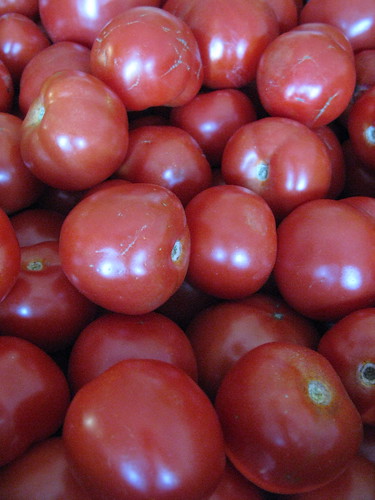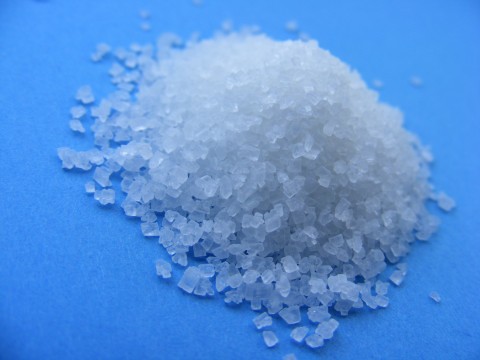Two separate articles have crossed my desk today both dealing with the issue of attempts to weaken the USDA Organic label. First off is a report by the Cornucopia Institute on the efforts being made by agri-business to fly under the radar of organic regulation by subverting the rules of organic egg production. Giving access to the outdoors to chickens does not mean providing them with a small caged run attached to an enormous chicken shed!
Likewise The Huffington Post reported today on efforts to sneak non-organic sulphites into organic red wine. Check out Ronnie Cummins article Proposed Sulphite Amendment Weakens Organic Standards.
If you struggle with sulphites this could be a matter of life or death.
Let's hope the USDA National Organic Board remember just who they're there to protect. Definitely two stories to watch!
Showing posts with label food. Show all posts
Showing posts with label food. Show all posts
Monday, October 18, 2010
Saturday, October 16, 2010
7 Foods To Avoid For A Healthy Life
1. Dr Fredrick Von Saal PhD, an endocrinologist, listed canned tomatoes as the main food he avoids. Unfortunately the resin linings of the cans contain bisphenol-A, a synthetic estrogen which has been linked to heart disease, diabetes and reproductive issues. As the tomatoes sit in the cans, their acid content breaks down the resin and releases the toxin. Before you know it, you're creating health issues along with your pasta sauce!
The solution: Buy tomatoes in glass jars or Tetra Paks (or can your own!)
2. Joel Salatin, farmer and author, avoids corn-fed beef. "We need to respect the fact that cows are herbivores," says Salatin, "and that does not mean feeding them corn and chicken manure." On the giant feedlots cows are fed corn and soybeans which fatten them up faster for slaughter. This keeps the prices at the grocery stores low (and more money in the cattle farmers pockets), but sacrifices nutritional value for the consumer.
The solution: (aside from eating less beef) Buy from Whole Foods stores or local farmer's markets. Cuts on the bone are also cheaper (and actually cook better and have more flavor too.)
3. Olga Naidenko PhD, a scientist for the Environmental Working Group, chooses to avoid microwave popcorn. A chemical known as PFOA is used in the lining of the bag and has been linked in animal testing to liver, pancreatic and testicular cancer. When the bag is microwaved the chemical migrates to the popcorn, which is then consumed and the toxin accumulates in the body.
The solution: Do what I do, pop your popcorn in a heavy-bottomed pan on the stove top. It takes no time and is very cheap!
4. Jeffery Moyer, chair of the National Organic Standards Board, stays away from non-organic potatoes.
Potatoes are treated with herbicides, pesticides and fungicides during the growing season and are then sprayed again after harvesting to prevent sprouting. All these chemicals are absorbed into the flesh of the potato making organic the only alternative.
5. David Carpenter MD, Director of the Institute of Health and the Environment at the University of Albany, recommends avoiding farmed salmon. Like the cows the salmon are fed soy, chicken litter and even chicken feathers. As a result farmed salmon is full of pesticides including DDT, which has been linked to a myriad of health problems including diabetes. The fish are also treated with antibiotics, not what you really want on your dinner plate.
The solution: Buy wild Alaskan salmon instead.
6. Rick North, project director for The Campaign For Safe Food, avoids milk produced with artificial hormones. Farmers treat their cows with rBGH, or rBST as it's also known, to stimulate milk production. Sadly this also leads to udder infections in the cows which results in pus in the milk. In all other industrialized countries this bovine growth hormone is banned.
The solution: Look for milk produced without growth hormones (rBST-free) or buy organic.
7. Mark Kastel, co-director of the Cornucopia Institute, stays away from conventional apples. Again it's the amount of pesticides used which are of concern here. Apples are one of the most doused fruits and with evidence mounting that exposure to these chemicals is putting farm workers health at risk, it makes sense to avoid eating something that has the potential to contribute to the development of neurological illnesses such as Parkinson's Disease.
The solution: Buy organic apples.
What are your thoughts on this subject? Are there certain foods you avoid?
Links:
Cornucopia Institute
The Campaign For Safe Food
Institute For Health And The Environment
National Organic Standards Board
Environmental Working Group
Monday, October 11, 2010
Canned Tomatoes
Last week I received a hot tip about where I could buy chemical/pesticide free tomatoes. I promptly reserved two 25lb boxes over the phone and then bought yet another when I collected them. I was also tempted by some delicious Jona-Gold apples while I was there and so those came home with me too. By the weekend I had 75lbs of tomatoes and 25lbs of apples sitting on my kitchen table.........waiting.
On Saturday I set to, soaking batches of tomatoes in boiling water until their skins slipped esily from their dark red flesh. I took out the cores and then turned a full 25lbs of them into preservative free provisions for the winter.
First I harvested some green jalapeno peppers from the garden, diced them finely and mixed them with some garlic and red onion in a large pan. I added the tomatoes, some apple cider vinegar and a few spices and set the aromatic concoction to simmer whilst I prepared my canning jars.
Water bath canning is very simple and there are lots of places on the web where you can learn more about it. One of my favorite resources is Pick Your Own, a site that not only lists farms and stands in your area that sell fresh produce, but gives you wonderful tips on how to make and can everything from jams to spaghetti sauce. I also enjoy Food In Jars, an inspiring blog full of ideas for canning produce and what to do with it when you finally open a jar.
My Jalapeno Salsa was a winner and I canned about 12 pints of it. I also made some Pasta Sauce using onion, garlic and the last of my fresh basil and several pints of Passata, the UK version of pureed tomatoes. I threw handfuls of chopped tomatoes into the food processor, chopped it down and then canned it. I used lemon juice in each jar, just to make sure there was plenty of acid to prevent mold. Citric acid can be a problem for people sensitive to MSG, so I searched for some lemon juice which was as pure as possible. If in doubt, squeeze a lemon!
Once I had transformed 25lbs of tomatoes into winter sustenance (and made the house smell like Italy), I poured the water I had used to soak my tomatoes in through the sieve containing the skins and squeezed them for all they were worth. What I got was tomato juice! Another quick canning session and I had 4 quarts of juice all ready for those soups and sauces which we love to eat when it's freezing cold outside.
Today I'm back in the saddle, converting another 25lbs of fresh Eastern Washington tomatoes into sauces and salsas to keep my family healthy during the next six months or so. It's backbreaking work at times, but worth every moment.
Links:
Pick Your Own
Food In Jars
Friday, October 8, 2010
Natural Flavors.........NOT!
"How many times have you seen the words 'natural flavors' on a label and thought, whew, good. Nothing bad there!"
This is the question posed by Lynn Stratton at the website Healthy Holistic Living. Lynn has been checking out Flavor Technology companies and gives us the lowdown on her findings in her article, Is it Real, Or Is it Senomyx? How New Flavor Technology Tinkers with Our Tastebuds. What she has uncovered is truly frightening, especially for those of us already sensitive to food additives. I urge you to read her article. If this kind of technology continues to be used under the guise of providing 'healthy' products, then the future of food is looking grimmer than ever.
With this in mind I just picked up 75lbs of pesticide free tomatoes which I will be canning over the coming days. When you can't trust your food supply, Grandma's ways really are the only alternative!
Photo:Public Domain Photos
Subscribe to:
Posts (Atom)


